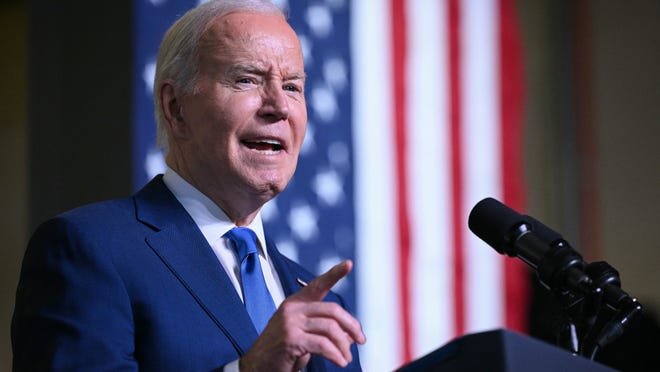President Joe Biden has contracted COVID-19 again but appears to be feeling fine, but any infection should be of concern given his age, experts said Wednesday.
Experts say the 81-year-old president is likely to only have a mild reaction to the virus because of his “excellent” track record of vaccinations and swift medical treatment, but that he is at higher risk of severe illness simply because of his age.
“It’s always a concern when older people get COVID-19,” said Dr. Paul Offit, attending physician in the infectious diseases department and director of the Vaccine Education Center at Children’s Hospital of Philadelphia, “but he’s certainly in the best shape possible. He’s been vaccinated, he took his paxlovir early on, and he’s certainly getting good medical care.”
According to the Centers for Disease Control and Prevention, people 65 and older account for more than 81% of COVID-19 deaths, and that age group is 97 times more likely to die than people between the ages of 18 and 29. People with other illnesses also are more likely to become seriously ill.
But Dr. Daniel Griffin, an infectious disease specialist and lecturer in clinical medicine at Columbia University, said Biden’s multiple vaccine doses and the rapid administration of the vaccine likely lower his risk of severe illness to about 1%.
Still, the risk is not zero, Griffin said.
“It’s a complicated situation,” he said. He has heart disease, which puts him at somewhat higher risk, but he also leads an active lifestyle.
“This isn’t just frail people in nursing homes. A lot of the deaths we’re still seeing are in immunocompromised and frail populations,” Griffin said.
“Our immune system changes as we age.”
Hospitalizations and emergency room visits are down significantly from January, when more than 2,000 people a week were dying from COVID-19. As of June 15, the CDC estimates that fewer than 150 people have died from COVID-19.
Griffin said the real worry is two weeks or a month from now, when Biden and others his age may not fully recover from the infection. One coronavirus outbreak is not a predictor of the next outbreak.
Biden first tested positive on July 21, 2022, and experienced mild symptoms. Nine days later, he tested positive again with a “rebound” of the virus that is sometimes experienced by patients who have been given the antiviral drug Paxlovid, doctors said.
Aging affects the body’s ability to fight off infection. “People sometimes forget,” Griffin said. “Our immune systems change as we age. What might be a runny nose or some other symptom for someone in their teens or twenties is not always the same for an older adult.”
Summer COVID levels are trending upwards.Tracking the spread of infection by region
Griffin added that a month or two after contracting COVID-19, many seniors notice they become short of breath after climbing stairs or are more forgetful than they used to be.
A presidential election involves shaking hands in a packed room, but all three major candidates — Biden, Republican nominee Donald Trump and independent Robert F. Kennedy Jr. — are over 70, Griffin noted.
“How wise is it to have an older man in this role when we live in a world where humanity is more vulnerable to things that we didn’t necessarily have to worry about six years ago?” he wondered aloud.


